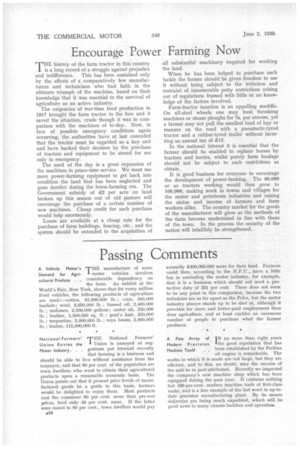Encourage Power Farming Now
Page 26

If you've noticed an error in this article please click here to report it so we can fix it.
THE history of the farm tractor in this country is a long record of a struggle against prejudice and indifference. This has been sustained only by the efforts of a comparatively few manufacturers and technicians who had faith in the ultimate triumph of the machine, based on their knowledge that it was essential to the survival of agriculture as an active industry.
The exigencies of war-time food production in 1917 brought the farm tractor to the fore and it saved the situation, crude though it was in comparison with the machines of to-day. Now, in face of possible emergency conditions again occurring, the authorities have at last conceded that the tractor must be regarded as a key unit and have backed their decision by the purchase of tractors and equipment to be stored for use only in emergency.
The need of the day is a great expansion of the machines in peace-time service. We must use more power-farming equipment to get back into condition the land that has been neglected and gone derelict during the horse-farming era. The Government subsidy of £2 per acre on land broken up this season out of old pasture will encourage the purchase of a certain number of new machines. Cheap credit for such purchase would help enormously.
Loans are available at a cheap rate for the purchase of farm buildings, fencing, etc., and the system should be extended to the acquisition of all substantial machinery required for working the land.
When he has been helped to purchase such tackle the farmer should be given freedom to use it without being subject to the irritation and restraint of innumerable petty restrictions arising out of regulations framed with little or no knowledge of the factors involved.
Farm-tractor taxation is an appalling muddle. On all-steel wheels one may haul threshing machines or steam ploughs for 5s. per annum, yet a farmer may not pull the smallest load of hay or manure on the road with a pneumatic-tyred tractor and a rubber-tyred trailer without incurring an annual tax of £.12.
In the national interest it is essential that the farmer should be enabled to replace horses by tractors and lorries, whilst purely farm haulage should not be subject to such restrictions as obtain.
It is good business for everyone to encourage the development of power-farming. The 60,000 or so tractors working would then grow to 100,000, making work in towns and villages for the motor and petroleum industries and raising the status and income of farmers and farm workers alike. The country market for the goods of the manufacturer will grow as the methods of the farm become modernized in line with those of the town. In the process the security of the nation will infallibly be strengthened.












































































